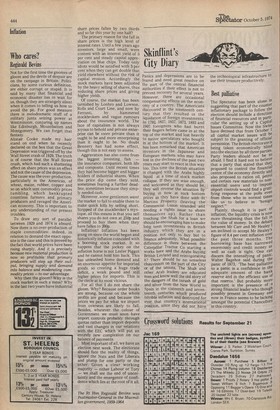Skinflint's City Diary
Panics and depressions are to be feared and need great resolve on the part of. the .central financial authorities if their effect is not to prevent recovery for several years. However,there are occasional compensating effects on the economy of a country. The Americans discovered in the nineteenth century that they resulted in the liquidation ot foreign investments. En 1792, 1837, 1857, 1873, 1893 and 1907 foreigners who had burnt their fingers before came in at the top of the market and lost heavily to native speculators who bought in at the bottom of the market. It has been remarked that American investors in the Japanese and European markets who may have lost in the declines of the past two years may start to react in this way too. This time the British situation is changed with the Arabs highly liquid at a time of stock market collapse. If they are wise enough, and welcomed as they should be, they will reverse the situation by buying in now at rock bottom prices as they have done with St' Martins Property (leaving the Commercial .Union stranded and needing a rights issue to shore themselves up). Rather than touching the Shah for a loan we should be encouraging him to make long term investments in British industry which they are in a position not only to buy but to finance adequately. What possible difference is there between the Caterpillar Tractor Co starting a works here and the Arabs buying British Leyland and reinvigorating it? There should be no senseless chauvinism on the part of the City or of the unions. The Shah and other Arab leaders are educated men and know well the old story of the dangers of the inrush of gold and silver from the New World to Spain in the sixteenth and seventeenth centuries which produced terrible inflation and destroyed for ever that country's international position, since they did not have
the technological infrastructure to use their treasure productively.
Best palliative
The Spectator has been alone in suggesting that part of the counter inflationary package to follow the election should include a direction of financial resources and in particular the setting up of a Capital Issues Committee. Now the Swiss have decreed that from October 1 all capital market issues will be subject to the granting of official permission. The British electorate is being taken economically blind into the election by all three parties. Party leaders should not be so afraid. I find it hard not to believe that a party that stated that the) proposed to control the financial centre of the economy directlyan°, also proposed to ration oil, petrol and certain raw materials to nonessential users and to impose import controls would find a gratifying response at the polls even from those who in normal times like us to believe in "benign neglect." Plainly, though it is part ef inflation, the liquidity crisis is ritr."/ more threatening than the fail in the value of money. In the debate between Mr Carr and Mr Healey I am inclined to accept Mr Healey, figure of 8.4 per cent inflation over the past three months. The borrowing base has narrowed enormously and credit money as well as cash is tight. One can discern the intensifying of panic. Walter Bagehot said during the panic of 1873, 'The best palliative to a panic is a confidence in the adequate amount of the bank reserve and in the efficient use af that reserve.' But probably more important is the presence of a strong financial leader who though possibly present in Germany and now in France seems to be lacking amongst the potential Chancellors in this country.
































 Previous page
Previous page